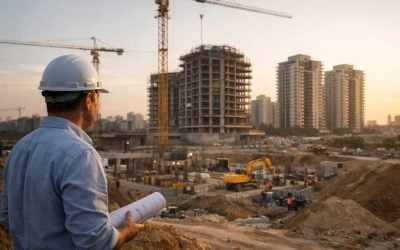Residential Housing Market: Growing Inventory & Steady Prices
High Unsold Housing Inventory
Israel’s real estate market is experiencing a significant increase in unsold new properties. Currently, about 81,500 newly constructed apartments across the country remain without buyers. This surplus represents approximately 19 months of housing supply, marking an unprecedented inventory buildup. Major cities, such as Tel Aviv with nearly 9,500 unsold units and Jerusalem with approximately 7,600, reflect this trend strongly. This rise in inventory follows a brief surge in sales at the end of 2024, as buyers rushed to finalize purchases ahead of a scheduled tax increase.
Market experts indicate these conditions point toward a potential market slowdown or mild recession in the residential housing sector, driven primarily by this excess supply.
Moderate Price Increases Persist
Despite growing inventory and reduced demand, home prices in Israel continue to rise modestly. Recent reports indicate an average increase of about 0.5% between November and December 2024, bringing annual growth to approximately 7.6%. Regions such as Jerusalem and northern Israel saw slightly higher price growth due to sustained demand linked to demographic growth and a persistent shortage of affordable housing.
Renting Increasingly Attractive Compared to Buying
Elevated interest rates have significantly increased mortgage payments, making buying homes considerably less affordable compared to renting. Traditionally, mortgage payments in Israel had been cheaper than monthly rents for similar properties. Currently, mortgage costs surpass rents by roughly 28%. Analysts predict this shift will lead more residents to prefer renting over buying, especially in the short to medium term, until affordability improves.
Commercial Real Estate: Retail Strength, Office Market Sluggishness
Retail Surge – BIG Fashion Center Opens Strongly
The recently launched “BIG Fashion Glilot,” an open-air retail center strategically located between Herzliya and Tel Aviv, experienced tremendous consumer enthusiasm upon its inauguration. The complex drew approximately 156,000 visitors during its opening weekend, creating severe traffic congestion yet yielding exceptionally high sales volumes for retailers. The mall’s successful launch is indicative of robust consumer demand and revitalization within the retail sector.
Office Space Market Stabilizing, Still Weak
In contrast, Tel Aviv’s commercial office market continues to exhibit signs of weakness, notably in tech-focused districts such as Ramat HaHayal, where vacancies remain high. Although leasing activity has slowed significantly, there are positive indicators, including recent leases of approximately 4,500 square meters by coworking companies. Industry experts view these transactions as early signs of market stabilization, although overall market conditions remain mixed.
Development Projects: Major Urban Renewal and High-profile Investments
Northern Israel Sees Urban Renewal Expansion
Northern Israeli cities are undergoing extensive urban renewal. Developer Av-Gad Holdings recently initiated the construction of around 4,400 residential units through urban renewal projects in areas such as Haifa Bay’s “Krayot” suburbs and Nazareth Illit. These developments aim to modernize aging neighborhoods, enhance infrastructure, and attract young families seeking affordable housing outside central urban hubs.
Landmark Project in Tel Aviv by Check Point and Israel Canada
Check Point Software, partnering with developer Israel Canada, has secured a prime land parcel of approximately 13,500 square meters in Tel Aviv’s Bitzaron neighborhood. The companies plan a large mixed-use development consisting of two high-rise buildings featuring about 310 residential units alongside 62,000 square meters of commercial and office space. Check Point intends to establish its corporate headquarters within the development, highlighting continued confidence in Tel Aviv’s real estate potential.
Regulatory and Policy Changes: Broker Ethics and Housing Support
Enhanced Ethical Standards for Real Estate Brokers
New real estate broker regulations went into effect on March 8, 2025, introducing stringent ethical requirements to professionalize the industry. Changes include mandatory disclosure of essential property details, clear guidelines on representation, stricter property advertising rules, and prohibitions against unauthorized brokerage fees. These measures align Israel with international best practices, enhancing consumer protection and market transparency.
Housing Initiatives for IDF Minority Veterans
The government recently launched a significant initiative aimed at providing affordable housing to minority IDF veterans, specifically Druze and Circassian ex-servicemen. The Israel Land Authority allocated around 210 discounted plots through a lottery system in regions such as the Golan Heights, with further distributions planned for northern Israel and the Negev region. This program is designed to support minority communities and foster regional development.
Taxation and Budget Updates: Real Estate Taxes Adjusted
New Property Tax Measures in Wartime Budget
Israel’s new budget includes significant adjustments to real estate taxation intended to curb speculative buying and generate revenue. Specifically, the finance ministry froze inflation-linked increases in property tax exemptions and capital gains tax thresholds until 2027. As property values rise, this measure effectively increases taxes on property transactions, a move expected to discourage speculative investing and increase government income.
Investment Activity: Foreign and Local Investors Remain Active
Rising Demand from International Buyers
Despite ongoing regional instability, foreign investors, particularly from diaspora communities, increased their property acquisitions significantly toward the end of 2024, especially in Jerusalem’s luxury real estate market. In late 2024, there was a marked increase in transactions involving high-value properties exceeding NIS 10 million each, sustaining the luxury segment during local market slowdowns.
Continued Confidence Among Major Domestic Investors
Domestic developers remain confident in Israel’s real estate, evident from significant recent transactions like the Check Point/Israel Canada joint land acquisition, valued around NIS 825 million. Furthermore, the number of investor-driven purchases notably increased in December 2024, demonstrating sustained investor interest despite economic uncertainties.
Mortgage Market: High Rates and Volatile Lending Activity
Elevated Interest Rates Impacting Mortgage Market
The Bank of Israel maintained its policy interest rate at 4.5%, keeping borrowing costs relatively high. Mortgage interest rates remain elevated, significantly raising monthly payments. Financial institutions have seen strong profits from higher lending rates, though consumer affordability remains pressured.
Fluctuating Mortgage Volumes
Mortgage activity saw considerable volatility following the January VAT increase. December 2024 experienced record-high mortgage issuance as buyers rushed to avoid higher taxes, with subsequent lending sharply dropping in early 2025. January mortgage lending volumes declined sharply compared to December yet remained above the previous year’s levels, reflecting continued market uncertainty and caution among buyers.
These developments encapsulate Israel’s dynamic and evolving real estate market amid economic and policy shifts.



